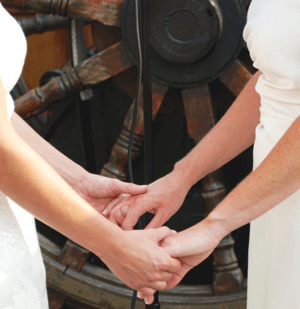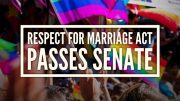 By: Lisa Keen/Keen News Service—
By: Lisa Keen/Keen News Service—
A federal judge in Norfolk, Virginia, told attorneys in a lawsuit challenging Virginia’s ban on same-sex couples marrying that she will render her decision “soon.”
According to David Boies, one of the lead attorneys arguing against the ban, U.S. District Court Judge Arenda Wright Allen listened “studiously,” took a lot of notes but “did not ask a lot of questions,” during Tuesday’s two-hour hearing.
Ted Olson, who is working with Boies and a team of lawyers sponsored by the American Foundation for Equal Rights, said the judge “didn’t hear a whole lot new” in the way of arguments, compared to the case Boies and Olson mounted against California’s Proposition 8. [pullquote]He noted that arguments made in support of the law included “variations on the same theme,” including the need to preserve “traditional marriage” and the male-female composition of marriage “since the beginning of time.”[/pullquote]
He noted that arguments made in support of the law included “variations on the same theme,” including the need to preserve “traditional marriage” and the male-female composition of marriage “since the beginning of time.” But Olson said those “very same arguments are ones people have been making in civil rights cases since the beginning of our country.”
“And as the [Virginia] solicitor general said, many of those same arguments were made in the past in an attempt to maintain Virginia’s law to prohibit persons of different races” from marrying, in the famous Loving v. Virginia case of 1967.
Tuesday’s case, Bostic v. Virginia, is one of two separate lawsuits filed in federal courts in Virginia challenging the state’s ban. The Bostic case was brought by two same-sex couples – Tim Bostic and Tony London who have been together for 24 years, and Carol Schall and Mary Townley who have been together 30 years and are raising a daughter.
“Carol and Emily and I own a home in suburbs, go to games, we shop at Target, we’re no different than anybody else,” said Townley, in a telephone press conference with reporters after the arguments. “Yet we are treated differently by Virginia laws.” Shaw noted that there were moments in Tuesday’s proceedings when she found herself near tears, hearing attorneys challenging the ban and “hearing these learned men understand what we are going through.”
Tony London told reporters he and Bostic simply “want to get married in the state we love.”
Virginia Attorney General Herring attended Tuesday’s hearing in Norfolk, where many protesters showed up with signs and chants criticizing his announcement that the ban is unconstitutional and that the state would argue against it. He called Tuesday’s hearing a “very significant step in the journey towards full equality under the law for all Virginians.”
Olson said, “the judge said she would study the matter…and render a decision ‘soon.’” He said he expects that, no matter which side wins, the case will be appealed the U.S. Court of Appeals for the Fourth Circuit and that his team would ask for an expedited appeal.
Boies noted the significance of an appeal to the Fourth Circuit, one of the most conservative in the nation and one that covers the southern states of Virginia, North Carolina, South Carolina, Maryland, and West Virginia.
The decision from the Fourth Circuit, he said, “would have the potential to change the opportunities of gay and lesbian citizens in a large number of southern states to actually enjoy equality.”
Interestingly, Associated Press began its pre-court coverage with a prominent notice of that possibility, saying the case “could give gay marriage its first foothold in the old Confederacy.”
Attorney General Herring, who also participated in the press call with plaintiffs and their attorneys, did not reflect that far back in history, but emphasized that, too many times in the past, Virginia has treated some citizens as second class. He was referring to cases in which Virginia opposed school desegregation, interracial marriages, and women attending Virginia Military Institute.
“The injustice of Virginia’s position in those cases will not be repeated this time,” said Herring.
Although the judge allotted three hours for arguments, only two were used, noted Olson, because two friend-of-the-court attorneys supporting the ban opted not to use their time. The judge had made a request before oral argument that attorneys not use their allotted time if it would duplicate arguments already made.
Casey Mattox, senior counsel for the Alliance Defending Freedom group that represented a county clerk who has intervenor status to defend the law, said in an email that his group’s arguments were “consistent with the strongly supported fact that the welfare of children is in enhanced when they are raised by their mom and dad.”
“This is backed by the common experience of Virginians and the most reliable social science,” said Mattox.
The Daily Press newspaper reported that Mattox colleague Austin Nimocks argued in court that “every society that ever lived” sees marriage as being one man and one woman.
Nimocks said Virginia’s ban “is not constitutional because it’s ancient, but it’s ancient because it’s rational.”
The Daily Press also reported that Virginia Solicitor General Stuart Raphael did depart from plaintiffs’ attorneys on at least one point. He urged the judge to issue an immediate stay of a ruling in favor of plaintiffs, if she rules Virginia’s ban is unconstitutional.
“We think the Supreme Court is going to agree” that the ban is unconstitutional, said Raphael, but he said issuing a stay until the Supreme Court can rule would help avoid a “huge mess,” like that experienced by same-sex couples in Utah.
Asked whether last June’s Supreme Court decision in U.S. v. Windsor, striking down the federal Defense of Marriage Act (DOMA), gave attorneys challenging Virginia’s marriage ban any new arguments, compared to those they made during the Proposition 8 trial in California in 2010, Boies said the Windsor decision was “very strong support for us.” He also cited as helpful last month’s decision from the Ninth Circuit, in SmithKline v. Abbott, that said the courts should give laws disadvantaging people based on sexual orientation heightened scrutiny.
The second federal challenge in Virginia, Harris v. Virginia, is scheduled to have a status hearing on February 12.
© 2014 Keen News Service. All rights reserved.







